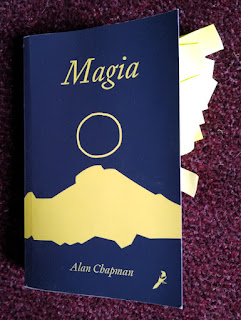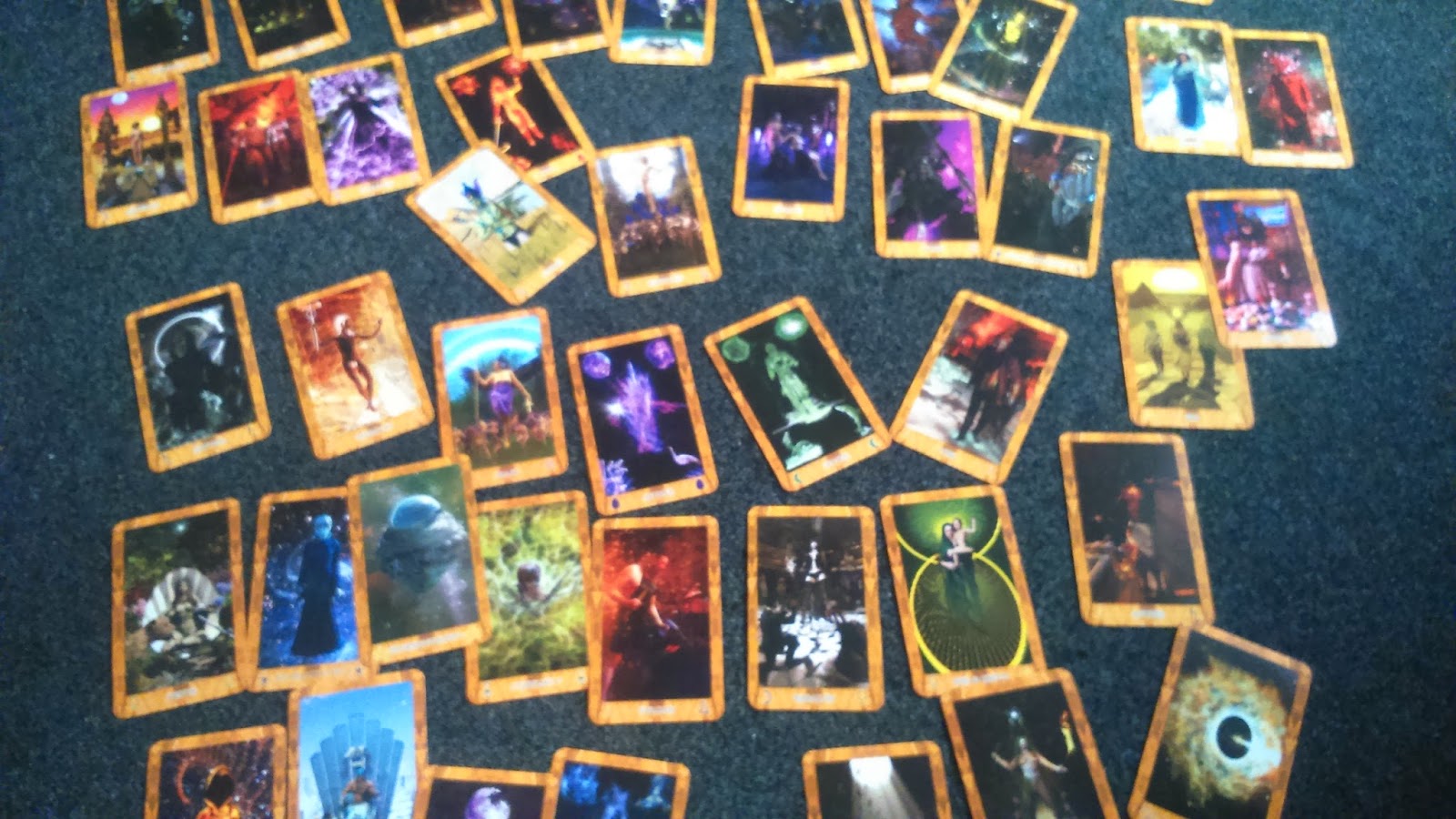MAGIA: The teachings of Alan Chapman
Available HERE.
How do you write a review of a book which is about spiritual enlightenment, awakening, attainment, initiation or whatever you wish to call it? And not just about awakening, but an actual full scheme for attaining it? I shall of course outline the contents, but what about evaluating what is written here? I shall also try to give some of the flavour of Chapman’s teachings; but sadly for those who hate cliches, it really is the case that when the student is ready, the teacher appears. Ultimately, what draws a student to a teacher is itself part of the mystery.
It seems to me that I can only evaluate what Alan Chapman is presenting as someone who has practiced the system; the only laboratory in which such writings can be tested is that of personal experience.
So I shall have to tell my own Magia story.
The book is a transcript of teachings delivered over six days at a retreat in Greece. It consists of those twelve sessions, with some unpacking, all rendered in blank verse. It contains an entire cosmology, a map of experience, plus a method of constructing your own cosmologies. I’ll come back to this. It contains a scheme of meditation which in my experience is unparalleled.
This is where I switch to my personal account.
I was one of the people there when Alan delivered the teachings.
This happened because Alan has been my meditation teacher for some ten years now.
That happened because Alan showed me that awakening was not only achievable but worthwhile. I’d had serious doubts before; it seemed like some exotic state that could only be reached by devoting the entire of your life (and other lives too if you believe in them). My view was reinforced by going on a vipassana retreat in 2005; as well as the 10 days of silence and the many hours per day of sitting, we had to watch DVDs of Mr Goenka lecturing us about vipassana. In these lectures, he said we needed to practice for a minimum of 2 hours a day for many lifetimes to have a chance at enlightenment. (Incidentally, I have an immense amount of respect for Goenka - he introduced meditation into the Indian prison system and probably saved many lives thereby. Maybe his recommendations are modelled on the life of a prison inmate.)
So what was the point of this obsessive pursuit of enlightenment through vipassana? I would probably have given up on the whole idea if I hadn’t met Alan Chapman and Duncan Barford, via the chaos magic scene. I witnessed their progress and their breakthroughs, which they wrote about on their blog Baptist’s Head. They were rendering transparent the process by which they reached awakening, and I could see that it was not only something that sounded like a good thing but that it could be attained in a single lifetime with a moderate amount of effort.
Alan and Duncan’s Baptist’s Head adventures found their way into print in the three diary-books, Blood of the Saints, The Urn and A Desert of Roses. These are still available as free downloads here.
So all of a sudden in 2009 I knew two people who had woken up and one of them was able to articulate how to follow suit.
Alan’s teachings had a number of incarnations over the next few years. After BH, there was Fountainhead, then Wiser By Design, then finally Magia.
Alan had been called by the inner planes entity Tempe, that he and Duncan had previously worked with. Tempe asked him to get the band back together for another skrying session with Duncan. This duly happened in April 2019; the transcript of their session forms an appendix of the present volume. It’s in the appendix because it is only the seed of the teachings; it was Alan’s 12 lectures at Lefokastro in May 2019 that grew it into a complete scheme. Much of it is in the form of dialogue, between Alan and the assembled (8) students. These dialogue sections unpack the ideas in the preceding talk.
The talks themselves are in a variety of registers: some visionary images, some discourse about the mysteries, some of which leads into practical instructions.
There are basically five of the latter: three meditations, all to be done lying down (as in the ‘incubation’ that was practised in the Apollo cave temples) and two other practices, called Binding: the binding of shadows and cosmological binding.
Cosmological binding is a thought process that starts with a state of consciousness that seems ‘higher', and through observing the structure of your experience arrives at an understanding of what kind of cosmos the experience implies you’re actually living in.
Being able to do this has a number of consequences, the most important of which is that the fluid and fugitive moment of ecstasy is fixed into your dayside thought processes. This is how you move from a state of consciousness to a stage of development. An awakening experience is then seen as a shift in your cosmology.
Previously, I vaguely recognized that there's a difference between states and stages. Having an experience of higher consciousness is a state; awakening is a stage, something that endures in the structure of your experience. I didn't know what made the one become the other until I learned Alan's system of cosmological binding.
Another upshot of this practice is that it enables the seeker to track their own progress. If you’re interested in this kind of thing I imagine you’ve looked into what the stages of awakening are said to be. For instance, there’s a chapter in Daniel Ingram’s book Mastering the Core Teachings of the Buddha (available free here) that deals at length with various Buddhist models of stages. While there is no mapping that will guarantee absolute correspondence between the different models, there is a surprising amount of correlation that suggests there’s a real distinction between these levels. However, with Chapman’s cosmological binding, you are freed from relying on the judgment of some teacher as to what stage you are at; you look around your experience and apply a few simple processes.
Of course, I have my reservations about the system. The practice of shadow binding is one of them. From the section ‘Binding Shadows in the House of God’:
To reveal your shadows
you need simply consider the light,
by taking up your place
in your room
in the house of god,
where you can lie down
and let the fire cast your shadows
on the wall.
You then take the images and emotions that arise and reduce them to stick-figures on a single sheet of paper. These figures and emotional states are then taken through some further processes, until the shadow is integrated fully into consciousness.
I was strongly attracted to this practice, because it seemed to promise a self-help approach to my tendency to depression. So I allowed myself to believe that with this technique I could ‘fix’ my low mood issues. I did a whole slew of bindings, a few of which seemed to work and many of which only resulted in my becoming more fixated on my problems. To be fair, Alan has revised this practice a number of times and the latest version is harder to misuse in that way. But I now treat binding as a delicate experiment that needs to be handled with care.
The Shadow Binding practice has another kind of appeal: it bridges the divide between magick and psychotherapy. Many magicians are dubious about psychotherapy - rightly so; not only are many psychotherapists not very good, but there’s often an assumption that there’s something wrong with you which needs fixing. This is an assumption many of us carry around; much of it seems to be a residue of Christian-era guilt, reborn in the atheist era as a vague sense of wrongness about ourselves.
Some of the time when we feel bad it’s because there’s something dysfunctional in our thinking, in our view of the world, that can be changed; this is the promise of shadow binding (and of good psychotherapy). However, it’s easy for some people to view themselves as riddled with faults which need remedying so that they can become more ‘perfect’. You’ve probably met such people, who seem to be addicted to therapy and self-help procedures.
I also have issues around relating to an actual living teacher. One of them is distinguishing their inspired utterances from the mere human prejudices and opinions that we all have. That’s one of the reasons I was attracted to chaos magick at the start of my magickal career rather than seeking out a guru. This is something we all have to work out for ourselves.
I passed a copy to a friend of considerable meditation experience and he said it read a bit like Peter Kingsley's Reality but turned into a usable system. Alan Chapman’s thing is certainly worth a look if you want to see a contemporary mystery school in full spate. An astonishing proportion of people involved in it have experienced one or more awakenings; there’s really nothing else that I’ve come across that’s even remotely like it.
Aside from this book, all the audio recordings of the original talks in Greece are here. This will give you a free taste of the material in the book. There are also a couple of videos on the same website.



Comments
Post a Comment